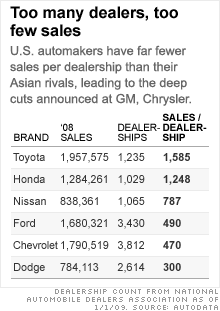Angry auto dealers flex muscle in Congress
Chrysler Group and GM cut dealerships as part of their bankruptcies, but dealers are urging lawmakers to force the two automakers to take them back.

NEW YORK (CNNMoney.com) -- Dealers who have been muscled out at Chrysler Group and General Motors are trying to get Congress to force the automakers to take them back.
The push by the dealers to reverse the cuts has garnered strong bipartisan support, especially from powerful Democratic leaders Financial Service Committee Chairman Barney Frank and House Majority Leader Steny Hoyer.
The measure, which restores franchise rights that were stripped out as part of the bankruptcy process, was attached as an amendment to an appropriations bill to fund a variety of federal regulators, including the Securities and Exchange Commission. It easily passed the House last Thursday.
It faces more opposition in the Senate, where Senate Majority Leader Harry Reid said earlier this week the measure is not a priority and that he was satisfied with the decision to have the automakers use bankruptcy to shed dealers.
"When you have a bankruptcy, there are winners and losers. That's what happened. And there were some losers. It's unfortunate, but that's the way the bankruptcy courts operate," he said.
But Reid's spokesperson backed away from those comments Thursday, saying that the majority leader was speaking off the cuff.
Even some of the measure's supporters acknowledge that many of the dealers being cut are unlikely to stay in business for much longer or restart their businesses.
The Chrysler Group dealers cut during the bankruptcy process were forced to stop selling Chrysler, Dodge and Jeeps in June while virtually all GM dealers being cut lose will be phased out by between January and September 2010.
"I think a number of them can be reopened, but it's not the goal of them to have them all reopen," said Rep. Rep. Steven LaTourette, the Ohio Republican who inserted the dealer language into the appropriations bill.
But if the franchise rights are restored, the automakers would have to spend millions of dollars to buyout the dealerships it wants to cut. When GM dropped the Oldsmobile brand at the start of the decade, for example, it spent about $1 billion to do so -- most of it in payments to dealerships.
Dealers and their supporters argue that larger dealership networks do not cost the automakers any money, and that it can actually increase their sales. They say it is unfair for state franchise laws, which protected their investment in the dealerships, to be thrown out in the bankruptcy process.
They also argue that at a time of rising job losses, it doesn't make sense to force dealerships to close, throwing more people out of work. The average dealership has about 50 employees, meaning the closing of 2,000 dealership could cost more than 100,000 jobs nationwide.
The dealers are well positioned to fight the battle in Congress. They are found in each congressional district, and many are successful business owners that have been supporting members of Congress since they first ran for for local elected office. Their influence in the Senate is generally acknowledged to be somewhat less than in the House, though.
The automakers and most auto industry experts argue that GM and Chrysler were hurt by a bloated dealership network that is a remnant of years gone by when they both had a much larger share of U.S. vehicle sales.
They say cutting the dealerships allows the surviving dealers to sell and service more vehicles, making them more profitable in a way that allows them to spend money on the advertising and their facilities needed to attract sales.
"If this legislation is enacted, it would put our viability at serious risk," said Greg Martin, spokesman for GM's Washington office. "Having the right number of dealers in the right location is essential to our ability to compete."
The Obama administration, which pushed the automakers to make even deeper cuts in dealer networks than they originally proposed, is fighting the dealers' efforts in Congress.
"The decision to invest taxpayer dollars into these companies required all stakeholders to make difficult sacrifices, and it would set a dangerous precedent, potentially raising legal concerns, to intervene into a closed Judicial bankruptcy proceeding on behalf of one particular group at this point," the administration said in a statement Wednesday.
The two automakers are also doing what they can to fight the dealers' efforts in Congress.
GM CEO Fritz Henderson was on a conference call with the Michigan delegation Wednesday evening, during which he was pushed by some of the company's greatest defenders in Congress to reach a deal with dealers to try to make them drop the legislative effort.
Some of the leading proponents of the measure in Congress say they also hope that the automakers can come up with a compromise solution to satisfy dealers and make the legislation unnecessary.
"Legislation is a hammer. I would prefer not to use a hammer," said LaTourette. "I'd rather use a scalpel. Let [the automakers] come in and work this thing out."
But a spokesman for the National Automobile Dealers Association said his group, which flooded Capitol Hill with more than 200 dealers visiting members of Congress earlier this week, said his group is committed to passing some form of the legislation to restore their rights.
"We are not interested in making a deal," said NADA's Bailey Wood. "There is an immense amount of support and it is growing on a daily basis. There is absolutely no reason we need to make a deal."
Even if the language is stripped out of the appropriation bill when it goes to the Senate, a stand-alone version of the bill has been co-sponsored by more than half of the House members and 24 senators so far. NADA is pushing to bring more than two-thirds of the House on as co-sponsors to prove they have the votes to override a veto. ![]()

